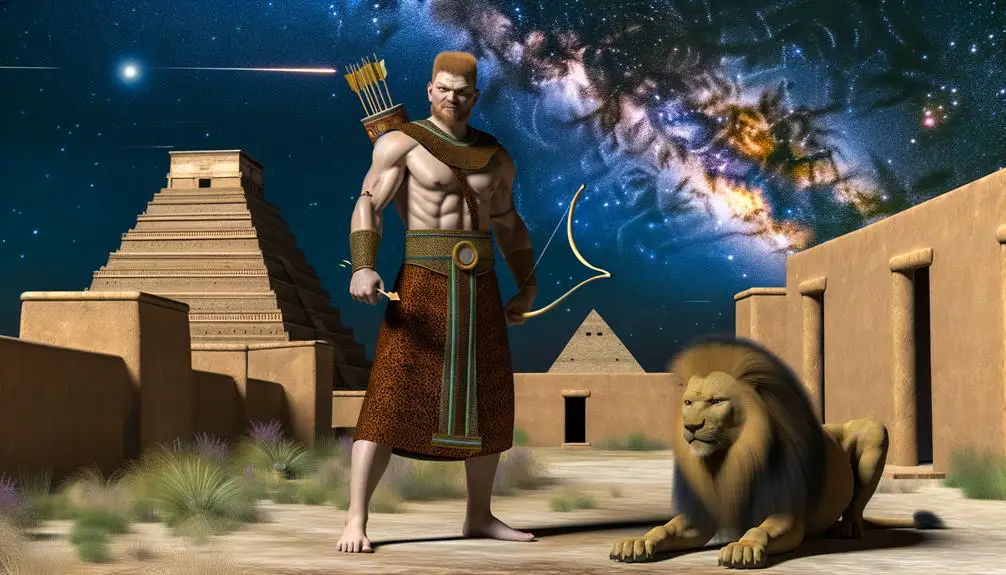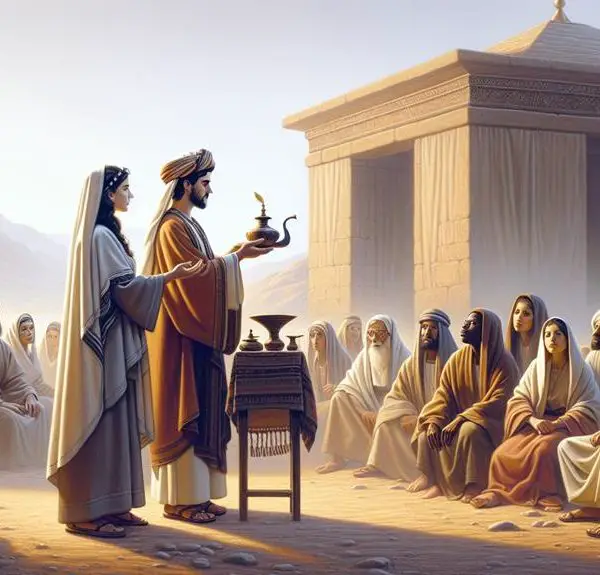Discover the profound lessons behind the names beginning with 'N' in the Bible, and how their stories might reflect in your life's journey.

N Names in the Bible
As you sow, so shall you reap—the Bible is rich with stories of individuals whose names start with 'N,' each embodying lessons that resonate through time.
From Noah's obedience in the face of an impending flood to Nehemiah's unwavering determination to rebuild Jerusalem's walls, these narratives offer more than just historical accounts; they provide insights into faith, perseverance, and redemption.
You might find yourself drawn to Nathan's bravery or Nicodemus's quest for truth under the cover of night. Let's explore together how their journeys can illuminate our paths today, leaving you with reflections on how their virtues and flaws mirror our own.
Key Takeaways
- Naomi's story in the Bible emphasizes resilience and the power of familial loyalty.
- Nehemiah exemplifies leadership with vision, determination, and ethical decision-making in rebuilding Jerusalem's walls.
- Nathan the Prophet demonstrates courage and wisdom through his confrontation with King David.
- Names starting with "N" signify characters who played pivotal roles in themes of redemption, leadership, and divine judgment.
Noah and the Great Flood

In examining the narrative of Noah and the Great Flood, it's pivotal to understand how this event underscores the themes of judgment and redemption within the biblical context. This story, deeply ingrained in the collective memory of various cultures, isn't just a tale of survival; it's a profound exploration of moral and ethical questions, where animal symbolism and flood geology play significant roles.
You'll find that animal symbolism in this narrative isn't merely about the survival of species. It's a rich tapestry that conveys the idea of a new beginning and the preservation of life through divine selection. Each animal, taken aboard the Ark in pairs, symbolizes the continuity of God's creation, despite human transgressions. This act of saving animals, alongside Noah's family, illustrates a message of hope and redemption, where life is given a second chance.
Flood geology, on the other hand, provides a fascinating lens through which to view this story. It's a concept that attempts to explain the geological history of the Earth in terms of the biblical flood. While controversial and debated among scientists, it underscores the magnitude of the flood narrative, suggesting a catastrophic event that reshaped the very foundations of the Earth. This perspective not only amplifies the story's dramatic tension but also highlights the power of divine judgment and the mercy shown to Noah and his family.
In this context, the narrative of Noah and the Great Flood serves as a compelling examination of divine justice, human responsibility, and the possibility of redemption. It's a story that resonates with profound themes, inviting you to ponder the complexity of the human condition and the hope for renewal.
Naomi: Bitterness to Joy

Transitioning from the tumultuous narrative of Noah and the Great Flood, the story of Naomi unfolds, illustrating a profound journey from deep bitterness to overwhelming joy. This tale, deeply rooted in Naomi's lineage, and accentuated by Ruth's loyalty, offers a compelling look at resilience and redemption in the face of despair.
Naomi's life takes a dramatic turn when famine forces her family to relocate from Bethlehem to Moab, only for her to lose her husband and sons. Returning to Bethlehem, she renames herself Mara, meaning 'bitter,' reflecting her profound loss and the emptiness she feels. However, the narrative takes a hopeful turn, showcasing the transformative power of loyalty and love.
- Ruth's unwavering loyalty to Naomi is a testament to the strength found in familial bonds, beyond blood relations.
- The story highlights the theme of redemption, as Naomi's lineage is secured through Ruth and Boaz, leading to her being the great-grandmother of King David.
- Naomi's journey from bitterness to joy is a powerful reminder of the capacity for renewal and hope in the midst of sorrow.
Analyzing Naomi's story, you'll find a rich tapestry of themes, from the depths of despair to the heights of joy, all woven through the steadfast loyalty of Ruth. This narrative not only underscores the importance of Naomi's lineage in biblical history but also offers an enduring lesson in the power of faith and the resilience of the human spirit.
Nehemiah: Rebuilding the Walls

As you explore the narrative of Nehemiah, you'll find his journey to rebuild Jerusalem's wall isn't just a tale of construction but a profound study in leadership. His actions showcase pivotal leadership qualities, such as vision, determination, and the ability to mobilize and inspire people towards a common goal.
The restoration of Jerusalem's wall under his guidance is a testament to effective leadership and collective effort, marking a significant moment in biblical history.
Leadership Qualities Displayed
Nehemiah's leadership in rebuilding the walls of Jerusalem exemplifies several key qualities, including vision, determination, and the ability to inspire and mobilize people towards a common goal. His journey underscores the importance of Ethical Decision Making and an Inspiring Vision, crucial for any leader aiming to effect significant change. Nehemiah's approach wasn't just about physical construction but also about rebuilding trust and unity among the people.
- Visionary Leadership: Nehemiah saw beyond the immediate challenges, envisioning a fortified, secure Jerusalem.
- Ethical Leadership: He made decisions that were fair and just, even when faced with opposition.
- Inspirational Motivation: Nehemiah's passion and commitment galvanized the community, encouraging them to work together towards a common vision.
These traits are vital for anyone looking to lead effectively, demonstrating that true leadership transcends time and context.
Jerusalem's Wall Restoration
The restoration of Jerusalem's walls, under the leadership of Nehemiah, represents a pivotal moment in biblical history, showcasing strategic planning and community collaboration at its finest. Nehemiah's approach combined ancient construction techniques with remarkable organizational skills, ensuring the project's success despite significant opposition.
Modern archaeological discoveries have shed light on the accuracy of these biblical accounts, revealing remnants of the walls that align with the descriptions found in Nehemiah. These findings not only validate the historical authenticity of the narrative but also provide insight into the engineering marvels of the time.
Nehemiah's story is a testament to the power of faith, leadership, and unity in overcoming adversity, making it a critical study in both spiritual and historical contexts.
Nathan: The Prophet's Courage

You'll find Nathan's confrontation with King David not just audacious but pivotal in biblical narratives, showcasing a fearless pursuit of truth.
His method of delivering a courageous message, through a parable, exemplifies the wisdom and tact required to influence a king.
Nathan's enduring impact stems from his ability to wield influence thoughtfully, ensuring his actions resonate far beyond a single moment in history.
Nathan Confronts King David
Nathan's bold confrontation with King David showcases the prophet's remarkable courage and unwavering commitment to truth. In a moment fraught with potential danger, Nathan stands before the king, not just as a messenger, but as a testament to divine judgment. His actions lead to royal repentance, highlighting the profound impact of his courage.
- Divine Judgment: Nathan's approach underscores the seriousness of David's actions, framing them within the context of divine law.
- Royal Repentance: The confrontation prompts a deep, transformative repentance from King David, showcasing the power of truth spoken with courage.
- Prophetic Integrity: Nathan's unwavering stance exemplifies the integrity expected of a prophet, serving as a bridge between divine will and royal authority.
Analyzing this episode, you gain insights into the dynamics of power, repentance, and the role of truth-tellers in shaping history.
Courageous Message Delivery
Delivering a message of divine rebuke to a king demands unparalleled bravery, a quality that Nathan, the prophet, exemplified when confronting King David. His courage wasn't just about fear overcoming; it was a testament to voice empowerment. Nathan's approach to David wasn't brash but strategic, ensuring his message was both heard and felt. This act of bravery serves as a powerful lesson in the importance of standing up for truth, regardless of the audience's power.
Aspect |
Detail |
|---|---|
Voice Empowerment |
Nathan's strategic delivery |
Fear Overcoming |
Facing King David directly |
Courageous Act |
Confronting with divine rebuke |
Nathan's story teaches you that true courage involves speaking truth to power, embodying integrity and faith in the most daunting circumstances.
Prophet's Impactful Influence
Building on the courage Nathan displayed in confronting King David, it's essential to explore how his actions had a profound influence, not only on the king but on the trajectory of biblical narratives. Nathan's brave delivery of God's message demonstrates the powerful role of prophets in shaping leaders' paths and ultimately, their nations' fates. Through his prophetic visions and unwavering spiritual guidance, Nathan exemplifies the impactful influence of divine messengers.
- Prophetic Visions: Nathan's ability to receive and interpret divine messages guided pivotal decisions and reforms.
- Spiritual Guidance: His counsel was steeped in moral and ethical principles, steering the king towards righteousness.
- Legacy of Courage: Nathan's boldness in confronting power set a precedent for future prophets, emphasizing the importance of truth over authority.
Nathanael: An Israelite Indeed

In the biblical narrative, Nathanael stands out as an exemplary figure of faith and integrity, embodying what it means to be 'an Israelite indeed' in the eyes of Jesus. Initially, Nathanael's skepticism towards the news of the Messiah's arrival underscores his discerning nature. Hearing of Jesus from Nazareth, he questions, 'Can anything good come out of Nazareth?' This skepticism isn't rooted in disdain but in a genuine quest for truth, illustrating a critical, yet open-minded character.
Christ's knowledge of Nathanael before their physical meeting is a pivotal moment. Jesus sees him under the fig tree—a place often symbolizing peace and study in Jewish tradition—before Philip calls him. This revelation not only dissolves Nathanael's skepticism but also highlights his genuine pursuit of knowledge and truth. Jesus' acknowledgment, 'Behold, an Israelite indeed, in whom there's no deceit!' is profound, setting Nathanael apart as a true seeker and believer, devoid of guile or falseness.
Nathanael's journey from skepticism to faith underscores a critical aspect of spiritual discovery: the transformation through personal encounter with the divine. His initial doubt doesn't disqualify him; rather, it leads to a sincere affirmation of Jesus as the Son of God. This narrative invites you to appreciate the depth of Nathanael's character and his significant, though often understated, role among Jesus' followers. His story exemplifies the transformative power of faith and the importance of integrity and openness in the pursuit of spiritual truth.
Nimrod: The Mighty Hunter

Moving from the quiet integrity of Nathanael, you'll now explore the legendary figure of Nimrod, a mighty hunter before the Lord, whose prowess and strength marked a significant departure from the humble beginnings of early biblical characters. Nimrod is a divisive and enigmatic figure, with ancient perceptions painting him as a hero and a king, while modern interpretations often delve into the darker aspects of his legacy, suggesting ambition that borders on hubris.
Here are three analytical points to deepen your understanding:
- Ancient Texts and Interpretations: Ancient perceptions of Nimrod from biblical and extrabiblical texts often celebrate his skills as a hunter and his role in establishing powerful cities. These accounts position him as a figure of might and ingenuity, a pioneer in the post-diluvian world.
- Symbolism and Allegory: In literary and theological analysis, Nimrod's character can be seen as an allegory for humanity's potential for greatness and folly. His story prompts readers to reflect on the balance between ambition and morality.
- Modern Reevaluations: Today, scholars and theologians reevaluate Nimrod's narrative, considering historical contexts that may have influenced his portrayal. This leads to a nuanced understanding of his character, where his achievements and failings are seen within the broader tapestry of human history and divine interaction.
Through these lenses, you gain a more complex view of Nimrod. He emerges not just as a mighty hunter, but as a figure whose story offers insights into ancient civilizations, moral dilemmas, and the enduring quest for understanding within the biblical canon.
Nabal: Foolishness Punished

Turning our attention to Nabal, we encounter a narrative where folly is met with divine retribution, highlighting the consequences of foolishness within the biblical text. Nabal's story is a fascinating study of marriage dynamics and wealth management, ensconced within the broader themes of wisdom and folly in the biblical tradition. As a wealthy but foolish man, Nabal's actions towards David and his men not only demonstrate a lack of hospitality but also a profound misunderstanding of the social and divine order of his time.
Aspect |
Nabal's Approach |
Consequences |
|---|---|---|
Wealth Management |
Hoarding, lack of generosity |
Divine retribution, loss of life |
Social Relations |
Disrespect, foolishness |
Near destruction of his household |
Marriage Dynamics |
Neglect, lack of partnership |
Intervention by his wife, Abigail |
Nabal's story offers a stark warning about the dangers of foolishness, especially when combined with wealth and power. His failure to recognize his wife's wisdom and the social obligations of generosity leads not only to his downfall but also places his entire household at risk. It is Abigail's quick thinking and understanding of the situation that ultimately saves them, showcasing the critical role of wisdom and diplomacy in averting disaster.
This narrative underscores the importance of prudent wealth management and the value of wise and understanding partners in marriage. Nabal's punishment for his foolishness is swift and severe, serving as a powerful reminder that folly, especially when coupled with wealth and poor marriage dynamics, can lead to dire consequences.
Nicodemus: Nighttime Seeker

As we explore the spectrum of wisdom and folly within the biblical narrative, it's essential to examine the intriguing figure of Nicodemus, a Pharisee who sought out Jesus under the cover of night. His story, nestled in the Gospel of John, presents a fascinating study of a man caught between the established religious norms and the compelling teachings of Jesus.
Nicodemus' curiosity drove him to Jesus, but his status as a Pharisee imposed constraints. He was a member of the Jewish ruling council, a position that demanded adherence to traditional interpretations of the law and often put him at odds with Jesus' radical teachings. Yet, Nicodemus represents a seeker of truth, willing to risk his reputation to understand Jesus' message about being born again to enter the Kingdom of God.
To deepen your understanding of Nicodemus' unique position, consider these points:
- The Pharisee's dilemma: Nicodemus had to balance his curiosity and his social and religious obligations, a testament to the inner conflict between personal faith and public duty.
- Nighttime visit: His choice to visit Jesus at night symbolizes both a literal and metaphorical search for enlightenment, suggesting an intimate, personal journey of faith.
- Subsequent appearances: Nicodemus' evolution from a nighttime seeker to a defender of Jesus before his peers and finally to one who cared for Jesus' body post-crucifixion illustrates a profound transformation.
Nicodemus' journey from curiosity to conviction highlights the power of personal faith exploration. His story encourages you to seek truth, even when it challenges established norms.
Frequently Asked Questions
How Do the Meanings of the Names Listed in the Article Reflect the Personalities or Destinies of the Characters in Biblical Narratives?
In analyzing how names reflect personalities or destinies, you'll find that naming traditions hold symbolic significance, deeply intertwined with characters' narratives.
These names aren't just labels; they're prophetic, offering insights into the individuals' paths and traits.
Are There Any Known Archaeological or Historical Evidences That Corroborate the Stories Associated With These N Names in the Bible?
You're delving into whether there's tangible evidence supporting biblical narratives.
Specifically, Nimrod's civilization and Noah's Ark stand out.
Archaeological findings have hinted at advanced societies that could align with Nimrod's reign, though direct links are elusive.
Meanwhile, Noah's Ark remains more mythical, with numerous expeditions failing to uncover definitive proof.
The quest for historical validation continues, blending scholarly analysis with the intrigue of ancient texts, yet concrete evidence remains a subject of debate.
How Have the Stories of These Biblical Characters Influenced Modern Literature, Art, or Culture?
Like seeds scattered across fertile soil, these stories have deeply rooted themselves in modern culture.
You've seen name-inspired fashion lines that pay homage to their timeless elegance, and character-driven movies that pluck at heartstrings, drawing directly from these ancient narratives.
Analyzing this influence reveals a tapestry where each thread is a testament to their enduring legacy.
These tales haven't just survived; they've flourished, shaping the very fabric of contemporary art, literature, and everyday life.
In What Ways Have the Interpretations of These Biblical Characters' Stories Changed Over the Centuries Across Different Christian Denominations?
As you dive into the interpretive evolution of biblical characters' stories, you'll find that denominational disputes have significantly shaped their understanding.
Over centuries, different Christian denominations have brought unique perspectives, often reflecting broader theological and cultural shifts.
This ongoing dialogue hasn't only diversified interpretations but also enriched the collective spiritual and intellectual heritage, demonstrating how deeply these narratives are woven into the fabric of Christian tradition and thought.
What Are the Lesser-Known Facts or Apocryphal Stories Related to These N Names in the Bible That Are Not Commonly Discussed in Mainstream Biblical Teachings?
You mightn't know, but there are fascinating, lesser-known tales and facts about biblical characters that don't always make it into mainstream teachings.
When you dive into the naming traditions and cultural impacts, you uncover layers of history and interpretation that have evolved differently across communities.
These apocryphal stories enrich our understanding, revealing how deeply intertwined these narratives are with the fabric of ancient and modern cultures.
It's a compelling exploration of faith and identity.
Conclusion
In your journey through the biblical landscape, you've encountered figures whose names begin with 'N,' each a unique thread in the tapestry of scripture. From Noah's resilience amid nature's fury to Nicodemus's quest for enlightenment under the cover of night, these narratives offer profound insights into faith, courage, and redemption.
Like stars in a vast sky, they guide us, illuminating paths to wisdom and understanding. Their stories, rich with historical and moral depth, beckon you to delve deeper, challenging you to reflect on your own journey.



Sign up